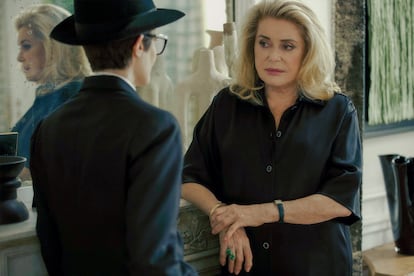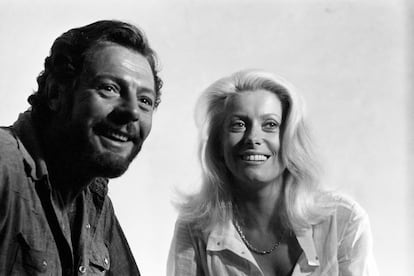“Bright, shy and funny.” This is how Catherine Deneuve (Paris, 80 years old) remembers Marcello Mastroianni, with whom she lived for four years in the seventies, creating one of the most legendary couples in the history of cinema. Sitting in the suite from a hotel in Cannes in front of some sweets and a coffee – “long, please” – the French actress, always reluctant to comment on her private life, finds herself in the impossible position of giving explanations about one of the most fascinating episodes. of her long biography: her romantic relationship with the great Italian actor. “I have no obligation to respond to anything,” she says with that mixture of authoritarianism and sarcasm that is typical of her and that will serve as a warning, more or less affectionate, to her interlocutor.
The motive is My Marcello, presented to mixed reviews in the festival’s competition. In the film, directed by Christophe Honoré, her daughter, Chiara Mastroianni, an actress in the midst of an existential crisis, experiences a psychotic episode during which she begins to speak, dress and behave like her father. From now on, she will be Marcello. Mother and daughter play their own roles, or something similar. “It’s not me in this story. It is Chiara’s story with her father and not mine. He doesn’t talk about my relationship with him. I don’t have scenes with him,” she said last Thursday. Still, Deneuve hesitated before accepting. “The idea of playing a character that bears my name does not excite me. At first, I wasn’t crazy about the idea. When I read the script, I changed my mind. I was convinced by its originality.” His unhealthy curiosity about her life didn’t make her hesitate. “It has always been like this, since Beautiful day. I am used to”.
“Remorse is separating yourself from the father of your daughter, who was still quite young. But life goes on, we only have one. When you are in a relationship, it is impossible to have only good memories.”
Escapists free themselves from straitjackets, emerge from cages, water tanks and barrels pierced by knives. Deneuve is also a master of escapism, only she escapes the questions. More than an interview, this will be a cordial struggle. Did the project plunge you into a certain nostalgia? “No not at all. Well, I felt a little melancholy, yes. But nostalgia, no. Do you know what I think? That what you have done is done. People often look back and wonder if they could have done things differently. I don’t believe in that much,” she replies. Deneuve and Mastroianni met in 1970, at Roman Polanski’s house. They were 19 years apart. Two years later, their daughter, Chiara, was born. After another two years, after five films together, their love ended. “Our life together has ended in failure, and I don’t like failures,” she declared then. “Not having the same education, the same roots and the same language has its difficulties.”
Today he remembers that story with no regrets, or very few. “Remorse is separating yourself from the father of your daughter, who was still quite young. But then life goes on, we only have one,” she says. In the film, she claims that she not only has good memories of that time. Is Deneuve speaking or just her on-screen double? “When you are in a relationship, it is impossible to have only good memories.” Are there more good than bad? “In principle, yes. When you have a child with someone everything is a little different…” Did you still have a good relationship after you separated? “It’s none of your business.” Silence. “Well, we kept seeing each other until he died, so the answer is yes.” They never married. “Well, he was already married,” Deneuve recalls. His relationship with the actress Flora Carabella had ended years ago, but Mastroianni, an atheist of Catholic culture, never wanted to separate. “I was lucky, because the law changed just the year I had my daughter. Otherwise, she would have been recognized as her father’s daughter, but not mine.” The fate of babies born out of wedlock in the middle of the last century.
Deneuve remains one of the few actresses of her generation, in France as in the world, capable of launching a project with just her name. From her beginnings with Jacques Demy and Luis Buñuel to her films with Arnaud Desplechin and Lars von Trier (from whom she says she learned “nothing”), her career traces a trajectory marked by permanent modernity. “She is the greatest European filmmaker,” says Quentin Tarantino, although she has not directed a single film. The actress, who detests the legend of her cold and haughty beauty, has fun contradicting the glamor that is associated with her public image. In a scene of My Marcello wears orthopedic sandals. In another, he plays volleyball on the beach. “No, no, no way! The movie takes place in summer, it is normal for him to wear Birkenstocks. “I wasn’t going to wear heels!” But then he admits that he likes such antics. “It is true that, when I did Potiche, by François Ozon, I suggested going out in a tracksuit and curlers. There may be a touch of insolence. It is not a provocation, just an inheritance from the education I received. “My father was a very ironic guy.”
The film also talks about the difficulty of being a nepo baby, a son or daughter of, a reason for undoubted privilege, but also for a certain intimate suffering, which comes from living a life in the shadow of famous, talented and genetically privileged parents. “Yes, it must have been difficult for Chiara at times,” she admits. “Everyone talked to her about it, but she has known how to handle it with humor and patience.”

In 2019, a vascular accident, from which she has fully recovered, forced her to take a break. That year she had released four films and shot two more. She now limits herself to making “one film a year”: she has just returned from Japan, where she has filmed Eric Khoo’s new film, in which she plays “a ghost,” she enthusiastically reveals. “I continue working because I love cinema. I’m quite a movie buff, I go to theaters a lot. There is one, L’Arlequin, next to my house, which is very good,” she points out about her neighborhood of Saint-Sulpice, the church of The Da Vinci Code, in the heart of Saint-Germain des Prés. “In France, cinema is holding up well. “He still has power.” She too. She usually puts him at the service of established directors, but also new ones. “I’m only interested in a good script, no matter where it comes from, but it’s true that youth gives me a lot of energy.” She calls herself a fan of French hip hop, for example, or the satirical show Daily, revered by generation Z in his country. “Don’t forget that I have children and, above all, grandchildren,” he explains.
“I have always felt comfortable on the left. Since I was young I felt that it corresponded to my way of living and, above all, of thinking. And I have not softened with the passage of time”
In recent decades, Deneuve has spoken out for abortion, against the death penalty, for the defense of the planet, in favor of Iranian or Lebanese women and in defense of socialist leaders such as François Hollande or Ségolène Royal. “In life, it’s not about what you say, but what you do. Facts, not words. Sometimes I see actors and actresses who try to look good and show their best side, but when you look at their lives there is not much evidence to support them,” she says. The actress considers herself leftist. “I have always felt comfortable there. Since I was young I felt that it corresponded to my way of living and, above all, of thinking. And I have not softened with the passage of time.”
For all these reasons, in 2018 it was surprising that Deneuve signed the explosive forum against sexual “puritanism” and in favor of the “right to bother.” Given the scandal generated, he apologized to the victims of sexual assaults, “and only them.” Today, in the midst of Me Too in French cinema, which includes directors with whom she has worked, such as Benoît Jacquot or André Téchiné, she does not want to talk about the matter anymore. “There is an overdose in the press and television. It’s over, I’m not talking about this topic anymore. I find it terrible. I hope everything calms down a little, but I’m not talking about this. It has become a big problem, because anything I say will circulate on the internet. “I don’t talk about it anymore, but I haven’t changed my way of thinking.” That’s what we feared. She laughs. “You are doing well.”
Subscribe to continue reading
Read without limits
_

